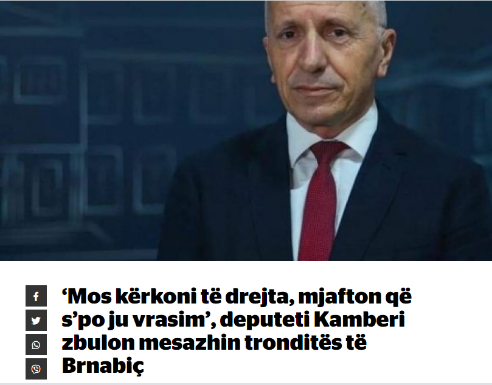BY ILDA HOXHA
A statement taken out of context by Serbian Prime Minister Ana Brnabic on the day of the Strategic Forum in Bled, Slovenia, sparked a wave of reactions and hate speech on social media. Sensational headlines and inaccurate content that were ‘copy-pasted’ on many portals and some media outlets in Albania had their origin in a post by Albanian Deputy in the Serbian Parliament, Shaip Kamberi. The published reports, without prior verification of the statement, only served the nationalist narrative and disinformation in exchange for clicks, to the detriment of society, according to communication experts.
A statement by the Serbian Prime Minister at the Strategic Forum in Bled, Slovenia, caused a stir in the Albanian media, with sensational headlines.
“Brnabic: It’s enough that we’re not killing you, don’t ask for rights! Shaip Kamberi responds,” wrote ‘Top Channel’ at the end of August.

Source: Top Channel
Furthermore, the report noted that it referred to Kosovo media.
The article was widely distributed, even in other Albanian media, where the main phrase highlighted by the media was the “threat” by the Serbian Prime Minister.
“”Brnabic: It is enough that we’re not killing you, don’t ask for rights! Albanian MP in the Serbian Parliament reacts,” wrote ‘Gazeta Dita’ in an article dated August 30.

Source: Gazeta Dita
The same article was also published by “Syri.net,” emphasizing that this statement by Prime Minister Brnabic was revealed by Albanian MP in the Serbian Parliament, Shaip Kamberi.
“Don’t ask for rights, it’s enough that we’re not killing you,” Deputy Kamberi reveals Brnabic’s shocking message,” reports ‘Syri.net.’.

Source: Syri.net
Meanwhile, the portal ‘Jeta Osh Qef’ did not cite any information source but simply presented what is claimed to be a statement by the Serbian Prime Minister.
“Don’t ask for rights, it is enough that we’re not killing you. Brnabic has threatened Albanians, and this message has sparked a lot of reactions in Kosovo,” writes ‘JOQ.

Source: JOQ
This statement was also described as “alarming” in some television chronicles, which did not cite any source for the distributed information.
“Don’t ask for rights, it’s enough that we’re not killing you. Brnabic’s statement is alarming,” writes NTV Televizion in a chronicle published on YouTube.

Source: NTV
The reports’ content does not have any reference to the statement, nor any confirmation from the Serbian Prime Minister regarding the alleged statement.
How was this information spread in the media?
The cause for this widely distributed news in the media seems to be a statement by the only Albanian deputy in the Serbian Parliament, Shaip Kamberi.
Through a Facebook post, Mr. Kamberi writes, among other things:
“Don’t ask for rights, it is enough that we’re not killing you, this is the message that Ana Brnabic, Prime Minister of Serbia, sent to the Albanians of the Presheva Valley, from the Strategic Forum in Bled.
According to Brnabic, Albanians in the Presheva Valley have ‘rights’ because no one is ‘killing’ them. This is a continuation of Serbia’s official policy of double standards for the treatment of minorities and the denial of basic rights to minorities within its territory, while trying to establish standards that do not exist in any other state for its own minority in Kosovo.
Brnabic seems to have said, ‘Albanians in the Presheva Valley are not targeted by anyone.”

Kamberi’s Facebook post
However, from this widely distributed Facebook post, it can be seen that the statement that received media coverage is actually an interpretation by the Albanian MP of what Serbian Prime Minister Brnabic reportedly stated at the Strategic Forum in Bled.
Faktoje also contacted Mr. Kamberi regarding this issue, but as of the publication of this article, we have not received a response from the Albanian MP.
Brnabic’s statement regarding the Albanians of the Presheva Valley
Faktoje conducted an online search for the statement by Serbian Prime Minister Brnabic and found a video published on the Kosovo online portal containing the content of Brnabic’s statement regarding the Albanians of the Presheva Valley.
The interview was conducted in Serbian on August 28, as reported by the portal, on the day of the forum, outside the venue of the activities. Regarding the developments in the Presheva Valley and Bujanoc, she said among other things:
“It is impossible for someone to target an Albanian in Presheva and Bujanoc and not be held accountable for it. It is impossible that in the last two years, we have had 400 attacks against Albanians, and no one is held responsible for them”.
Regarding this statement by the Serbian Prime Minister, Faktoje also contacted colleagues from the fact-checking organization ‘Istinometer’ in Serbia. They explain that from the verifications they have conducted, it is evident that the statement has been taken out of context.
Istinometer colleagues clarify that Brnabic said it is impossible for someone to kill Albanians in Serbia without being punished for it.’
Language of hatred fueled by the media
Taking statements out of context by the media, as done by the Albanian MP, is seen as dangerous by communication experts, especially when dealing with such sensitive issues.
“The political interpretation of the statement made by an Albanian deputy from Bujanovac in Belgrade is not as sensational as the headlines on the portals, but its explanation should be seen in the context he interpreted it.
With this news, the media did nothing different from other news; they ‘copy-paste’ a headline, as they do with pandemic headlines, nuclear weapons, and VIP weddings. They reposted it without thinking, for clicks. It is dangerous to frame it in the idea of intentional misrepresentation, just because it is Serbian. These are turbulent waters,” explains communication expert Edlira Gjoni.
According to the expert, such framing also contributes to the spread of a language of hatred.
“Portals that distribute news with sensational headlines and unverified content suffer from a lack of professionalism and, knowingly or unknowingly, spread a language of hatred to attract readers. This is a damaging practice for both society and public discourse,” argues the expert.



